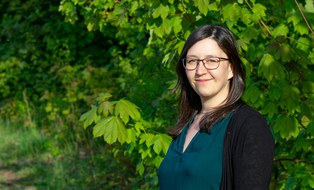Sep 21, 2022
Good Question: I should be writing, but then keep doing something else...How can I change this?
Many good questions are asked in the writing consultation at the TU Dresden Writing Center. To the question "I should actually write, but then keep doing something else...How can I change that?" Betty, trained writing peer tutor since 2022, gives a first answer:
Maybe the following situation sounds familiar to you: Today you wanted to finally start working on your writing project and are on your way to the library. Then you meet fellow students who ask you if you would like to go for a coffee with them. "There's still so much time!" is a thought you might have right now. You spontaneously go out for coffee. Afterwards, you might think to yourself "Hm, now it's to late to start anyways..." and go straight back home. Maybe you're annoyed because (once again) you haven't made any progress with your writing project. At some point, you may start to feel like your writing project is almost impossible to complete in the time you have left. To prevent this, a helpful first step can be to consciously set partial goals and priorities right from the start!
You can prioritize on different time levels. In the long term, you can ask yourself: What tasks and how many of them can and do I want to take on in addition to my writing project (e.g., university classes, part-time job, additional courses, volunteer work, hobbies, ...)? Is it realistic to fit all of these things into a typical week and still have some free time left to react to unexpected things and also to "just" relax? Tip: Create an overview that contains all subtasks of your writing project as well as your other (university) tasks. Then set a deadline for each (sub)task.
In the medium term, you can use your overview to distribute your various tasks over the individual weeks and months. This will make you realize how much you actually have to do. The it-is-so-much-time feeling will possibly vanish into thin air and you will realize when which task has to be tackled so that the entire plan can work out in the end.
In the short term, weekly and/or daily plans will help you ensure that you "find" enough time in your day to work on your various tasks. It is worthwhile to roughly plan the week in advance. You can do this, for example, as follows: First, take a few minutes to brainstorm and jot down all of your upcoming tasks and things you'd like to do in the coming week. Then take a look at this collection and assign priorities e.g. according to the Eisenhower method (instructions, PDF). Then you decide (also paying attention to already fixed dates), which of them fit into your week and enter the corresponding dates. Make sure that there are still free time slots left. A helpful rule of thumb is to schedule a maximum of 60% of your free time. Also plan activities that are good for you and fun. Ideally, one whole day a week should be completely free of writing and other university tasks.
Your plan won't always work. But it will increase the likelihood that you'll move forward with your writing project. If your plan didn't work out completely, you can learn from it and incorporate your insights directly into the next plan. Your plans will probably become more and more realistic - and ideally you will be able to have a spontaneous coffee with your fellow students every now and then, because your weekly plan still contains free time slots that you can use to complete the task you actually planned.
If you have difficulties in implementing your plans, then seek support! We will be happy to discuss your individual task packages and time schedules for your writing projects in the writing consultation. If you generally find it difficult or impossible to motivate yourself for your studies, other good places to turn to are the Central Student Advisory Service (Zentrale Studienberatung) or the Psychosocial Counseling Center (Psychosoziale Beratungsstelle) of the Studentenwerk.
 © Franz Mäge
© Franz Mäge
Wissenschaftliche Hilfskraft
NameBettina Damnik
Schreibberatung, Workshops
Send encrypted email via the SecureMail portal (for TUD external users only).
This post appeared on the occasion of the October 2022 Writing Center Newsletter. This and other newsletter issues are linked in the Writing Center Newsletter Archive.
 © TUD
© TUD
Writing Center of TUD
Send encrypted email via the SecureMail portal (for TUD external users only).
Visiting address:
Fritz-Foerster-Bau, room 571 Mommsenstr. 6
01069 Dresden
Postal address:
TUD Dresden University of Technology
Zentrum für Weiterbildung/Career Service
Schreibzentrum
01062 Dresden
The Writing Center of the TU Dresden (SZD) supports students and lecturers with offers for planning and writing various texts in studies such as vouchers, protocols, seminar papers and theses and for teaching academic writing in teaching and supervision. All information about offers and possibilities of support can be found in the areas for students and teachers.

